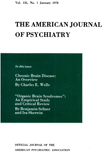IS THE HUMAN PERSONALITY MORE PLASTIC IN INFANCY AND CHILDHOOD?
Abstract
The article reviews data, much of rather recent origin, bearing on the assumption that human personality is more plastic in infancy and childhood than in adulthood. The available data permit the following conclusions:
l. We have no compelling evidence of a predictable relationship between child training practices and later personality.
2. Severe psychological stresses can have as marked effects in adulthood as in infancy and childhood, sometimes having greater effects in adulthood than in childhood.
3. Important personality changes occur after childhood (in the absence of treatment) including the disappearance of marked psychological disorders.
4. Infants reared according to ostensibly ideal methods of infant care show no greater immunity to mental illness than do other children reared differently. Infants reared under apparently inadequate or harmful circumstances do not necessarily develop psychological disorders.
5. Resemblances between patterns of behavior in children and adults can be explained without the hypothesis of a special impressionability or vulnerability of personality in childhood.
6. The initial immobility and the prolonged physical dependency of children upon adults places them at a special disadvantage in that they cannot readily change their environments to obtain new experiences. A lack of new experiences may give to the personality a pattern which appears more fixed than it really is.
The assumption that the human personality is more plastic in infancy and childhood than in adulthood remains unproven. Neither is it disproven. We need much further research in this area and this research may eventually show that the human personality is more plastic during childhood in some respects, but not in others.
Access content
To read the fulltext, please use one of the options below to sign in or purchase access.- Personal login
- Institutional Login
- Sign in via OpenAthens
- Register for access
-
Please login/register if you wish to pair your device and check access availability.
Not a subscriber?
PsychiatryOnline subscription options offer access to the DSM-5 library, books, journals, CME, and patient resources. This all-in-one virtual library provides psychiatrists and mental health professionals with key resources for diagnosis, treatment, research, and professional development.
Need more help? PsychiatryOnline Customer Service may be reached by emailing [email protected] or by calling 800-368-5777 (in the U.S.) or 703-907-7322 (outside the U.S.).



